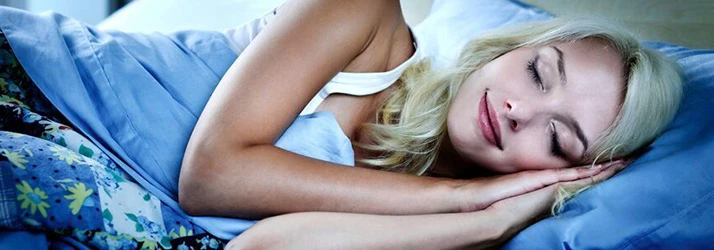Put Those Sleep Problems to Bed in Kingwood TX
Put Those Sleep Problems to Bed in Kingwood TX

Simple, powerful tips to finally get a good night’s sleep, provided by our Kingwood TX chiropractor.
Tips in Kingwood TX
- Avoid carbohydrate before-bed snacks such as grains and sugars. This will raise your blood sugar and cortisol and make falling asleep difficult. Later, when blood sugar drops too low (hypoglycemia), you might wake up and not be able to fall back asleep.
- DO eat a high-protein snack a few hours before bed. This can provide the L-tryptophan needed to produce melatonin and serotonin. For example, a piece of beef jerky or a handful of nuts.
- Sleep in complete darkness or as close to it as possible. If there is even the tiniest bit of light in the room it can disrupt your circadian rhythm and your pineal gland’s production of melatonin and serotonin. There also should be as little light in the bathroom as possible if you get up in the middle of the night. Please, whatever you do, keep the light off when you go to the bathroom in the middle of the night. As soon as you turn that light on you will immediately cease all production of the important sleep aid, melatonin.
- No TV right before bed. Even better, get the TV out of the bedroom or even out of the house, completely. It is too stimulating to the brain and it will make you take longer to fall asleep. TV also negatively affects your pineal gland’s ability to make melatonin.
- Wear socks to bed. Due to the fact that they have the poorest circulation, the feet often feel cold before the rest of the body. A study has shown that this reduces night waking.
- Read something spiritual or calming. This will help you relax. Don’t read anything stimulating, such as a mystery or suspense novel, as this may have the opposite effect. Also, if you are really enjoying a suspenseful book, you might wind up unintentionally reading for hours, instead of going to sleep.
- Keep a journal. If you lay in bed with your mind racing, it may be helpful keeping a journal and write down your thoughts before bed.
- Get to bed as early as possible. Your adrenal glands do the lion’s share of their healing during the hours of 11 P.M. and 1 A.M. On top of that, your gallbladder flushes out toxins from the liver during these few hours. If you’re consistently awake during these precious hours, the toxins back up in to the liver. Then the whole “sewer system” backs up. Not good. (In a perfect world, you’d go to sleep when the sun went down, and rise with the sun.”
- Reduce or avoid as many drugs as possible. Many medications, both prescription and over-the-counter may have effects on sleep. In most cases the condition for which the drugs were prescribed for in the first place, can be helped naturally, without side effects.
- Avoid caffeine. Seems like a no-brainer, right? A recent study showed that in some people, caffeine is not processed efficiently. These people can feel the effects long after drinking it. So… an afternoon cup of coffee (or even tea) will keep some people from falling asleep at night. Do not drink any caffeinated drinks after 4 P.M.
- Alarm clocks and other electrical devices. If these devices must be used, keep them as far away from the bed as possible, preferably at least 3 feet away.
- Avoid alcohol. Although alcohol may make you feel drowsy, the effect is short lived. Alcohol causes a sharp spike in your blood sugar, but several hours later your blood sugar will drop just as far. This can wake you up and make it very difficult to fall back asleep. If that wasn’t bad enough, alcohol prevents you from falling into really deep and restful stages of sleep, where your body is able to heal.
- Lose weight. Being overweight can increase the risk of sleep apnea, oxygen starvation, which will prevent a restful night’s sleep.
- Go Gluten-free and Casein-free. In a huge number of people, these proteins in milk and wheat cause inflammation, apnea, congestion, stomach and GI upset, gas, all symptoms that make sleep difficult.
- Don’t drink any fluids within 2 hours of going to bed. This will reduce the chance of needing to get up and go to the bathroom, or at least minimize the frequency.
- Take a hot shower, bath, or use a sauna before bed. When body temperature is raised in the late evening, it will fall at bedtime, facilitating sleep.
- Remove the clock from view. It will only add to your worry when constantly staring at it. 2 A.M… 3 A.M… 4:30 A.M… just turn it away from you.
- Keep your bed for sleeping. If you are used to watching TV or doing work in bed, you may find it harder to relax and to think of the bed as a place to sleep.
- Investigate the health of your adrenal glands. Scientists have found that insomnia may be caused by over-stressed adrenal glands. A simple saliva test can find out how healthy or how weak your adrenal glands really are.
- If you are menopausal or perimenopausal… The hormonal changes at this time may cause problems if not properly handles. Female hormone problems are incredibly mis-managed, especially during menopause. You have options! (That doesn’t include HRT.)
- Don’t change your bedtime. You should go to bed, and wake up, at the same times each day, even on the weekends. This will help your body to get into a sleep rhythm and make it easier to fall asleep and get up in the morning.
- Make certain you are exercising regularly. Exercising for at least 30 minutes every day can help you fall asleep. However, do not exercise too close to bedtime or it may keep you awake. Studies show that exercising in the mornings is best if you can do it.
OFFICE HOURS
Monday
7:30am - 6:00pm
Tuesday
7:30am - 6:00pm
Wednesday
7:30am - 6:00pm
Thursday
7:30am - 6:00pm
Friday
Closed
Saturday & Sunday
Closed
Clark Chiropractic & Wellness
562 Kingwood Dr
Kingwood, TX 77339


